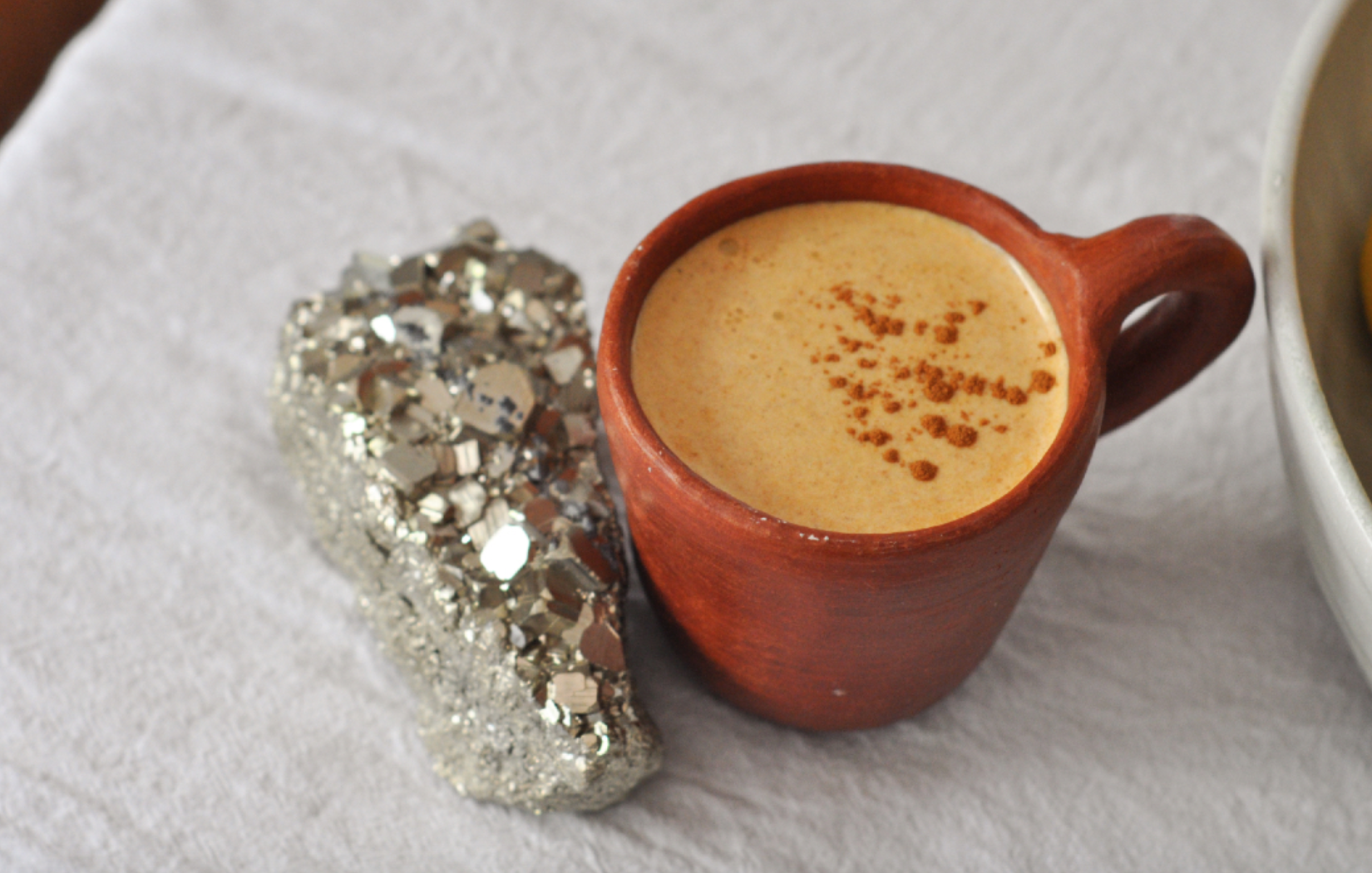Golden Milk
Contributor: Shonna Steppe
Photographer: Lacy Phillips
We are coming into the Autumn season. Our bodies are adjusting from those long, hot Summer days, into the cooler, dew-filled mornings and evenings of Fall. Those long-sleeved shirts and hot teas are showing up again as we wake and ready ourselves for the day, and our immune systems are in need of a boost as well. We’re seeking to balance the Vata dosha (the energies that govern flow and motion in the body) and to prevent colds and the flu by supporting the digestive and respiratory systems. Golden Milk is a comforting warm drink that can boost a weakened immune system and has long been a medicinal drink in Ayurvedic traditions.
The Ingredients
Coconut Cream & Hemp Milk
These milks are used to help prevent mucus build-up in our bodies, as drinking pasteurized cow’s milk can result in phlegm that can aggravate the respiratory tract. Coconut cream is essentially coconut milk, but made with 4 parts coconut to 1 part water (as opposed to 1 part to 1 part in regular coconut milk), making it thicker. Coconut milk in particular contains Medium Chain Triglyceride fatty acids, which are essential for the absorption of turmeric into the body. Hemp milk is low in fat and is a nice alternative to nut milks for those who have nut sensitivities or allergies.
Turmeric
Turmeric has an ancient history for healing. This root has powerful anti-inflammatory aspects, is good for drying damp conditions in the body, and helps move stagnant blood. It is also a proven anti-oxidant in cancer treatments, is healing for cardiovascular disease, protects the liver, can provide relief for rheumatoid arthritis, and can be used as a treatment for IBD. It has a warm, peppery, bitter taste. Turmeric gives “Golden” Milk its name, due to its vibrant color.
Ginger
Ginger is a warming herb used in both Chinese and Ayurvedic medicine to treat colds. Used fresh, ginger increases peripheral circulation and encourages sweating. It also stimulates our digestive enzymes. Dried ginger is more effective for stimulating circulation in the heart and lungs, serves as an anti-inflammatory for arthritis, and assists the body in clearing toxins. It has also been shown to act specifically against E. Coli and Shigella bacilus.
Raw Honey
Raw honey is an amazing conglomerate of nutrients.. The most important part of this ingredient is the word “raw.” Pasteurized, filtered, or refined honey is missing essential vitamins, minerals, and enzymes. Various parts make up what we know as “honey.” Bee pollen, for one, is a superfood; it is a complete protein. Propolis, which is the sticky, thick resin that bees use to repair their hives, is antiseptic, antibiotic, antibacterial, antifungal, and has antiviral properties. By itself, honey calms coughing, soothes the throat, and reduces phlegm.
Cinnamon
Cinnamon is an important antifungal spice that protects the intestines by helping to balance intestinal flora. It is great for the lungs, as it clears mucus and encourages circulation. Cinnamon is dry and hot, pushes blood to the joints, and with its penetrating affects, can clear toxins from the body.
Vanilla Bean
Vanilla is a wonderful, sweet spice that is hand-pollinated and expensive in most parts of the world. It contains anti-oxidants that are toxic to many microbes in the body. Vanilla also inhibits DNA damage and is fat soluble.
Black Peppercorn
Black pepper is regarded as a useful spice for general prevention. It stimulates warmth in the body—specifically in the abdomen—and has been used to treat diarrhea. Black pepper is important in Autumn as it opens up the pores and encourages sweating; this spice boosts the lungs and protects against colds and flus. Curcumin, the active constituent in turmeric, has anti-inflammatory properties. When Piperine, the active constituent in black peppercorn, is added, curcumin’s effectiveness is multiplied. When combining the two, note the ratio is only 1part black pepper to 10 parts turmeric.
Coconut Oil
Coconut oil is unlike other fatty acids. It acts like a carbohydrate; it is absorbed directly from the stomach into the liver, where it is burned as fuel for the body. It creates less stress on our pancreas—it does not have to produce enzymes specifically to break it down—as it does with other types of oils. This oil is antifungal, antiviral, and antibacterial, while also strengthening the immune system and preventing heart disease. Coconut oil provides healthy energy, improves digestion, and supports weight loss. It is also an amazing oil to cook with, as it is a healthy saturated fat, and can be an important part of a vegetarian or vegan’s diet.
Dried Star Anise
Anise is a warming, stimulating herb. It has a licorice flavor, and is chewed traditionally in China to sweeten the breath. It can dry up dampness in the body, which helps prevent viruses and disease. Anise also clears liver stagnancy.
Golden Milk Recipe
1 tbsp. Fresh Grated Turmeric
2 tbsp. Fresh Grated Ginger
1 tbsp. Coconut Oil
1/2 tsp. Whole Black Peppercorn, roughly smashed in the morter and pestle, or the bottom of something heavy
1 Vanilla Bean, scraped (keep both seeds and bean pod)
1 cup Coconut Cream
1 cup Hemp Milk
2 tbsp. Raw Honey
1-2 Dried Star Anise
1 Cinnamon Stick, broken in half
Preparation:
Start by slowly heating the grated turmeric and grated ginger in the coconut oil in a sauce pan, on medium-low heat. This brings out the flavor and aroma.
Once you can smell the flavors have married (a couple minutes), add the peppercorns for another 30 seconds
Now add the vanilla pod and its seeds, and both cream and milk to follow
Once milk is warm, add the raw honey and whisk
Finish with the dried star anise, and cover the sauce pot to let flavors all come together for about 10 minutes, keeping heat on low. No need to bring to simmer.
Stir, adjust seasonings to taste
Pour into a cozy mug, add the cinnamon stick, and enjoy!

